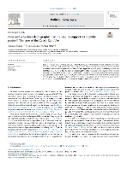How and why does demographic decline lead to support for populist parties? The case of the Czech Republic

Publication date
2025Published in
Political GeographyVolume / Issue
117 (Neuveden)ISBN / ISSN
ISSN: 0962-6298ISBN / ISSN
eISSN: 1873-5096Metadata
Show full item recordCollections
This publication has a published version with DOI 10.1016/j.polgeo.2024.103261
Abstract
In recent decades, a strong demographic decline has characterized post-communist Central and Eastern European countries. Using the Czech Republic as a case study, we apply a multilevel structural equation model to test the mechanism whereby demographic decline translates into support for populist parties. Combining regional and individual data, we show that the long-term demographic decline (measured at the regional level) recorded between 2008 and 2017 had an impact on preferences in favour of two populist parties: the radical populist party, Freedom and Direct Democracy (SPD), and a more moderate populist party, ANO 2011. The results of this analysis point to a mechanism where demographic decline is associated with a breakdown of social capital, which is then associated with voting behaviour in favour of both populist parties.
Keywords
Demographic decline, Populism, Social capital
Permanent link
https://hdl.handle.net/20.500.14178/3077License
Full text of this result is licensed under: Creative Commons Uveďte původ 4.0 International





